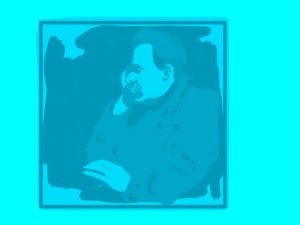After reading Annelies Shuldte-Nordholt’s text, I completely agree with the idea that Blanchot’s relationship to Nietzsche is never to be taken in isolation, but always in “constellations” where Nietzsche appears at the same time as a “companion” to other author (or a latent source of their power to make us think in today’s conjuncture), and – in some privileged cases – as forming a kind of “antithetic couple” (I am particularly thinking of Hegel, of course, but also Kafka, and Sade).
The question at stake is always écriture, in particular – when it comes to Nietzsche – the question of “écriture fragmentaire” which is underlined both in Le pas au delà and in L’entretien infini (and practiced in Le pas au-delà). I won’t deal with all that, which Annelies will treat in her presentation.
For my own reflections, I will focus on Hegel and especially on Sade compared to Nietzsche, for two main reasons (closely associated):
- I want to emphasize how, for Blanchot (and others at the same time, that he endorses/reviews), Nietzsche is the author who writes “in excess of philosophy” (very different from “anti-philosophy”). This is completely true of Sade as well, in Blanchot’s description, although the “philosophical reference” is not the same (not completely); and the “procedure” (or style) of excess is also not the same (if somebody does not write in fragment, this is indeed Sade, but they both practice “repetition”, according to Blanchot).
- However, there is a strong -and provocative- common element, which is “la folie d’écrire”, the madness of writing (we might add: of writing madness), crucial indeed when it comes to “exceeding philosophy” (or reason; or perhaps “neutralizing” it, in the Blanchotian sense of the “neuter”). And, in both cases, there is also an allusion to writing as “crime”.
So, I want to see if this leads me somewhere (it is very tentative and experimental, just returning to the texts and making sense of some of their literal phrases). Perhaps it will lead me also to return to the question of “interruption” and the “rapport du 3ème genre,” which in my opinion is one of Blanchot’s lasting demands on our thought (but I am not sure I can get as far as that).
I will be using the following chapters from L’entretien infini (The Infinite conversation), as most of the passages from Le pas au-delà which are indeed relevant for me have replicas in L’entretien infini:
- III “Parler ce n’est pas voir”
- IV “Le grand refus”
- VII “Le rapport du troisième genre”
- VIII “L’interruption”
- VI.3 “Réflexions sur le nihilisme: Nietzsche et l’écriture fragmentaire”
- IX.3 “L’insurrection, la folie d’écrire”
- XIII. Sur un changement d’époque: l’exigence du retour”
- XVIII “L’absence de livre”

